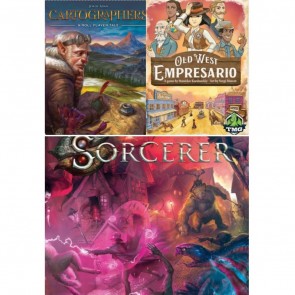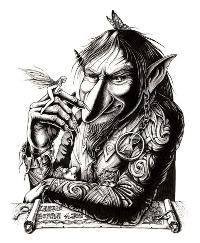Another batch of capsule reviews...
As much as I appreciate that the rise of the “roll and write” genre has bucked the trend toward massively overproduced, wasteful games, there haven’t been many that have really captured my attention beyond a fleeting glance. Cartographers, from the designer of Roll Player, is the exception because it is an exceptional example of this kind of game. It is a delightful, evocative design that offers some wonderful puzzle-like gameplay with minimal components and a great concept. Whereas Roll Player was a sort of meta-thing with players creating an RPG character, Cartographers is all about laying out the map of a fantasy world.
Each turn a card is flipped showing one or two terrain types and a Tetris-like shape. Players have to choose one of the options and fill in their map grid with the terrain type and in the corresponding shape. Some options may give you a coin, which are used in the scoring. There are also monsters that may appear, and when this happens you give your map to another player and they choose where to put them – if you fail to map the squares around the monsters you’ll take some negative points when it comes time to tally up the round. This little bit of take-that is one of the things that really elevates this design above the pack.

It’s played over four seasons – in the Spring the A and B scoring condition cards are used, in the Summer it’s B and C, Autumn is scored on C and D, and for the Winter it’s D and back to A. These cards indicate how everything scores based on the relative geography of your map- adjacencies, areas of specific sizes, making connections between the pre-printed mountains, and so forth. The puzzle element comes in juggling these scoring criteria and working out the most profitable arrangements of shapes and terrain. But there is a longview involved as you must be mindful of the future scoring opportunities.
The depth is greater than expected, and it doesn’t feel as ruthlessly capricious as some of the other popular roll and writes (Ganz Schon Clever for example). It’s also quite satisfying at the end of the 20-30 minute game to see a little map that you’ve drawn and if you’re doing it right, named. I’ve really enjoyed playing Cartographers as a solo puzzle (there are some minor rules changes related to the monster cards), but it is also quite welcome at a table with virtually any number of players – it makes for a fun, light game with room for conversation. I think the box says it plays up to 99 players, and that is totally do-able as it has a Bingo-style format.
It’s compact, inexpensive, and engaging – exactly what I want out of this kind of design. I also especially appreciate that it is a novel concept, and it is free from needless gimmickry or novelty. It’s the best roll and write I’ve played to date and I predict that Cartographers will enjoy a long run at the top of many game players’ lists of the best in the genre.
Last year Tasty Minstrel Games put out Pioneer Days, and it was a lovely surprise- a family-weight game full of diverse characters. This year, they’ve followed it up with a kind-of sequel in Old West Empresario, another light, family weight dice drafting and action selection design.. But this time out, it’s not about the journey but the destination. The idea is to build a successful township on newly settled land, claiming building tiles that activate on certain die choices and looking for profitable opportunities to earn points based on placement, an array of publically available conditional scoring cards, and building tiles with three stock icons. Of course each of the characters has a special ability.

Like Pioneer Days, playing the game is easy enough. Before a round, two D6s per player are rolled and slotted into the corresponding columns on the display. On your turn, you choose one die (with the option to pay coins to bump the value up or down) and you have the option of claiming a building tile in that column and putting it under construction in your town, discarding one of the tiles for income, or using the die value to activate corresponding buildings in your town a la Settlers or Machi Koro. Some buildings have a “when built” effect or an end of game bonus.
Scoring is measured in population, as your town abstractly grows larger and more profitable. Once someone has 15 buildings in their tile display, there’s a final points tally. There’s more than a little Kingdomino in how it all scores up, and I’m also reminded somewhat retroactively of how Cartographers, reviewed above, scores as well. Fans of tile placement puzzles will feel aptly rewarded.
There is a little depth here, as well as the kind of light, passive-aggressive interaction that characterizes many Eurogames. Building the towns and working out the best arrangements for scoring, as well as planning for which tiles to aim for in the draft, can be satisfying in a comfortable, familiar way.
Although I like this game and have enjoyed playing it with both friends and my kids, it is also one of those designs that seems to struggle to find a strong sense of identity. It’s a good game, well designed, and reasonably fun to play. But it also lacks a spark, which even Pioneer Days had. It doesn’t excite or compel, and in the end tally it succeeds primarily because it’s accessible and easy to play. I’m not left with a burning desire to play it again or often, despite mild good will toward it. This is fine, of course, but this is the kind of game that I think is really injured by the way games are marketed, sold, and discussed in today’s hobby. 20 years ago, this could have been a big hit. Today, it feels like it’s not quite positioned where it needs to be to reach the seemingly dwindling audience for smaller, single-purchase family style Eurogames. It lacks the impact of something like Azul or Kingdomino, which it really needs to be noticed.
Sorcerer makes a hell of a first impression – pentagrams everywhere. I found its commitment to visual diabolism charming and appealing in equal measure. But this go at a “CCG in a box” style game from White Wizard Games (Star Realms, Epic, Hero Realms) left me with a chill no amount of hellfire could warm. As much as the concept grabbed me- Victorian-era black magicians, warlocks, demons, vampires and other assorted hellions battle for control of London across a couple of key locations- the rote gameplay simply doesn’t incite me to the kinds of diabolism I had hoped for.
There’s a lot of good in this big box. The setting and illustrations are terrific, the production is all-in and it looks dynamite on the table. I really like the modular deck construction format, wherein you pick three sets of cards (a Character, a Lineage, and a Domain) and that comprises your deck. This is cool, and it gives at least a touch of the feeling that creating a bespoke Magic deck, for example, has. It also means that there’s plenty of replayability to explore if it grabs you more than it did me. Each of the deck modules also gives you a special ability card, so there is a stronger-than-usual sense of in-game identity – reinforced by representing the players as standees placed on the location boards that define the battlefield.

Gameplay follows a “take one action” structure metered in six actions per round. The currency is energy, which each player spends to place minions and weapons into each location. There’s a sense of escalation throughout, making the decision to take energy or draw cards instead of putting more cards into play a tough one. The pacing is pretty tight, and the build-up to the combat phase can feel tense and competitive.
After the sixth round, each location with minions in play sees a little dice-based combat, with hits assigned first to enemy minions and then to the location itself. The goal is to reduce two out of three locations to zero on your side of them. There’s an awful lot of rerolling, which to me is always a sign that the designer doesn’t trust the player to accept the randomness of dice-based resolutions.
All of this sounds fun but it is all just over-complicated enough to reduce engagement. For example, that dice-based combat looks great on paper, but there’s those rerolls, damage assignments, and other clutter that makes it feel clunky. Cards take damage that you have to track. There are critical hits and special abilities that you can use if your character is at the location. It’s just a little more crunch than the game warrants, which puts the game sort of outside its class.
Here’s the root of the problem. There are a thousand games that are, to some degree, very much like Sorcerer. John Clowdus’ Omen: Reign of War and Knizia’s Blue Moon immediately spring to mind as superior examples of this loose genre concept. Both are superior games because they are more focused, refined, and uncluttered. Sorcerer places the complexity in the wrong areas, with all of the options available each turn, energy management, cards that give you those reroll tokens, keyword synergies and so forth. The result is a game that is definitely decent, but also definitely unremarkable. I couldn’t point at a single element of Sorcerer and say “this is why you should play this game” – beyond the plentiful pentagrams and pseudo-satanic imagery, which may be a non-starter for some anyway. There are simply better games like this, and I’m not really sure why someone would choose to play this over battle deck Magic or something like Keyforge if they really want a CCG-like experience.
 Games
Games How to resolve AdBlock issue?
How to resolve AdBlock issue? 





















